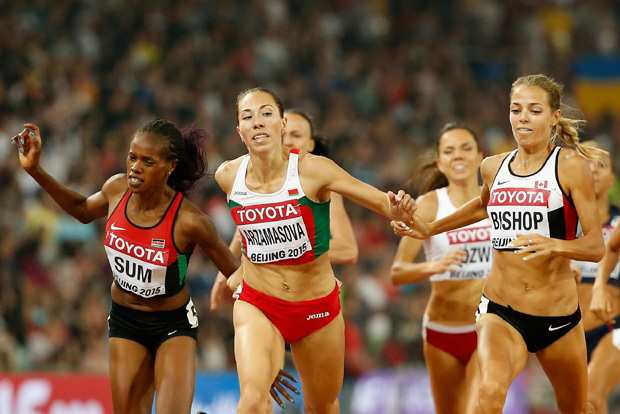The woman who beat Melissa Bishop-Nriagu to gold at 2015 worlds banned for doping
Marina Arzamasova, who beat Bishop-Nriagu to the line to win gold at the 2015 world championships, is banned until 2023
 Photo by:
Christian Petersen/Getty Images for IAAF
Photo by:
Christian Petersen/Getty Images for IAAF
Belarusian Marina Arzamasova, the runner who beat Canada’s Melissa Bishop-Nriagu in the 800m at the 2015 world championships in Beijing, has been banned from competition by the Athletics Integrity Unit (AIU) for four years after a failed out-of-competition drug test in 2019. Arzamasova ran to gold in Beijing in 1:58.03, just 0.09 seconds ahead of Bishop-Nriagu, who won silver. Arzamasova’s positive test came on July 29, 2019, and she has been suspended from competition since August 22 of last year. Arzamasova will only be disqualified from events she raced between her failed test and eventual suspension, which means there will be no medal upgrade for Bishop-Nriagu.
https://www.instagram.com/p/6_jSjFRBGN/?utm_source=ig_web_copy_link
Arzamasova’s ban
The AIU reports that Arzamasova tested positive for ligandrol, or LGD-4033, which can increase muscle mass and help with recovery. Arzamasova’s ban begins retroactively on the day she recorded the failed test, and she will not be eligible to compete again until July 29, 2023. She will also be disqualified from the two events in which she competed between July 29 and August 22, and she will have to forfeit any prize money she won at these races.
RELATED: The shockingly high prevalence of blood doping in endurance track events
Seeds of doubt
There’s no proof Arzamasova was doping in the years before her failed test in 2019. From 2015, when she ran her 800m PB of 1:57.54 (which she recorded in the semi-finals in Beijing) and won her gold medal, she saw a steady decline in her results. In 2016, her season best was 1:58.36. The next year, she failed to break two minutes in competition, and her fastest 800m result was 2:01.92. After a year off from competition, she returned to elite racing in 2019, a season in which she saw even slower results and a year’s best of 2:02.51.
The Disciplinary Tribunal has banned middle-distance runner Marina Arzamasova of Belarus for 4 years for the presence of a prohibited substance, a violation of the @worldathletics Anti-Doping Rules.
Find out more ?️⬇️https://t.co/cBkQOqSHT4#AIUNews
1/2 pic.twitter.com/LpVsW8x6jE— Athletics Integrity Unit (@aiu_athletics) December 4, 2020
One could give Arzamasova the benefit of the doubt and speculate that, after seeing her times dip slower and slower, she decided she needed to turn to illegal means to return to her previous form. But with the news of her ban, Arzamasova doesn’t necessarily deserve to be given the benefit of the doubt, and her actions have now planted seeds of uncertainty and suspicion in the minds of track fans — and likely in the mind of Bishop-Nriagu herself — as they wonder whether Bishop-Nriagu should have been crowned world champion in 2015.

